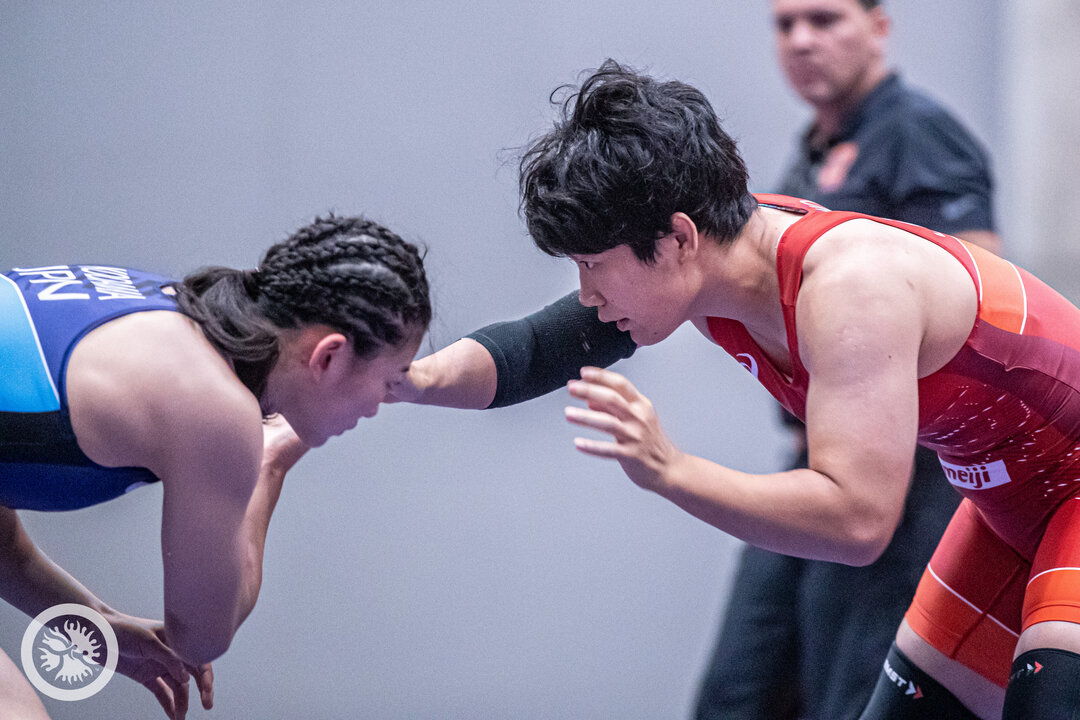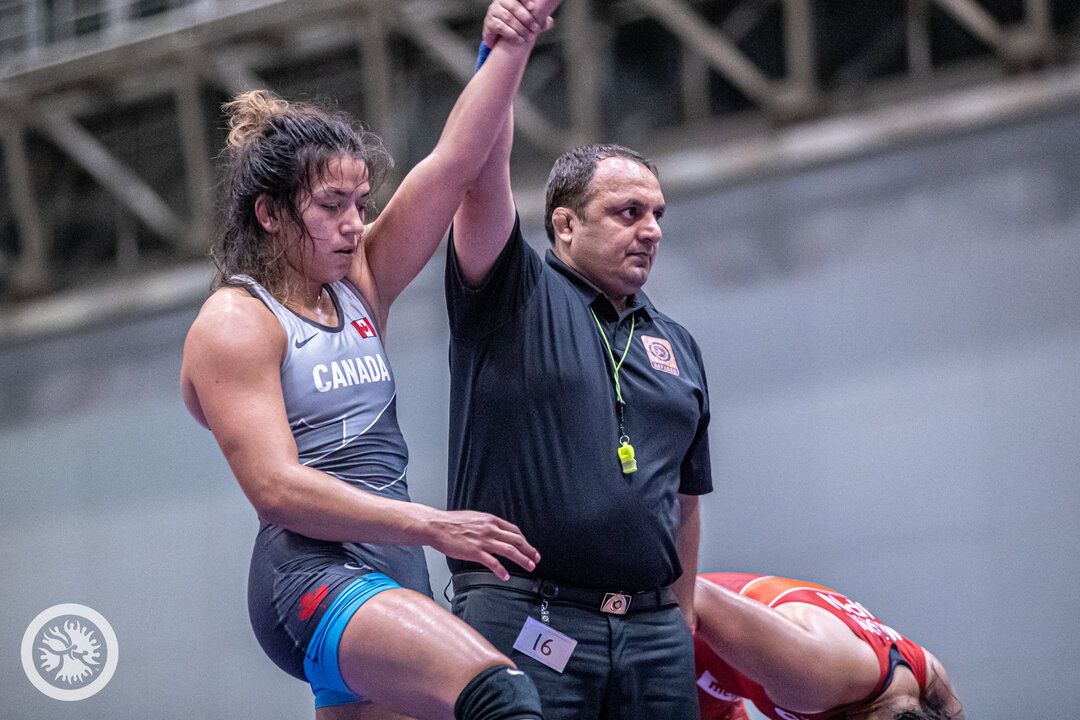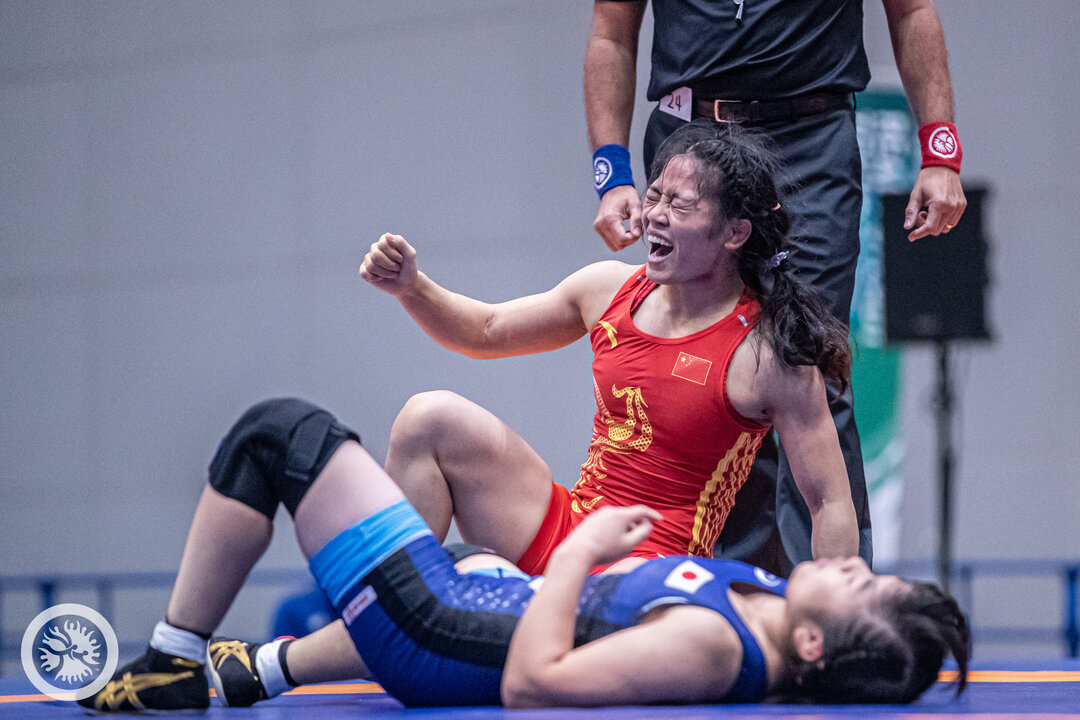#WrestleTokyo Olympic Games Preview: 62kg
Friday, July 23, 2021 - 20:25 By Ken Marantz

TOKYO, Japan (July 23) -- Since women's wrestling was added to the Olympic program in 2004, only six countries have won gold medals, with Japan the dominant power by winning 11 of the 18 handed out. At the Tokyo Olympics, the country with the best chance of joining that elite group is a small former Soviet republic in central Asia.
Kyrgyzstan is pinning high hopes on Aisuluu TYNYBEKOVA (KGZ), the reigning world champion at 62kg who has lost just one match since her historic triumph at the 2019 World Championships, which earned her a third trip to the Olympics.
If anyone can burst Tynybekova's bubble, it will likely be either local hope and world bronze medalist Yukako KAWAI (JPN) or 2018 world champion Taybe YUSEIN (BUL).
Others who appear capable of breaking through against that trio are 2019 world bronze medalist Henna JOHANSSON (SWE), 2016 Rio Olympic bronze medalist Marwa AMRI (TUN), European champion Irina KOLIADENKO (UKR) and teenaged Asian qualifier Sonam MALIK (IND).
Tynybekova already made Kyrgyzstan history by becoming its first-ever wrestling world champion, male or female, since it became independent in 1991. Striking gold in Tokyo would make her the nation's first-ever Olympic champion in any sport --- in six Olympics, the country has one silver and three bronzes, all won by men.
The 28-year-old Tynybekova came close five years ago in Rio, making it to the semifinals before losing to Valeria KOBLOVA (RUS), then coming away empty-handed after falling to Sakshi MALIK (IND) in the bronze-medal match. She had lost in the first round at the 2012 London Olympics.
"We have been going at this for a very long time," Tynybekova was quoted as saying in a January 2020 interview with Sputnik. "I have already participated in two Olympic Games -- in London and Rio de Janeiro. I didn't manage to win medals in them because of my mistakes. The only thing missing from my piggy bank is an Olympic medal. I want not just a medal, but a gold one."
Tynybekova's rise to the top is all the more remarkable given the fact that she didn't start the sport until she was 15. Four years after that, she was appearing at the London Olympics. Since then, she has medaled at every Asian Championships between 2013 and 2021 (except when she missed 2018 due to injury), with a total of four golds.
She and Kawai have developed quite a rivalry that has extended beyond the continent. In their first encounter in the final at the 2019 Asian Championships, Tynybekova came out on top of an 8-6 decision. Five months later, Tynybekova ended a close match with a fall in the third round at the World Championships.
The 23-year-old Kawai finally got her revenge when the two were drawn together in the first round at the 2020 Asian Championships, winning 6-1 for Tynybekova's lone loss between a defeat in the final of the Poland Open in August 2019 and now.
Over that span, Tynybekova chalked up titles at the Yasur Dogu, Matteo Pellicone, Poland Open and Individual World Cup in 2020, and Asian Championships (in the absense of Japan and China) and Poland Open this year.
"Since Kyrgyzstan gained independence, we have not had a gold medal in Olympic sports," Tynybekova said. "I want to make history by winning a gold at the Olympic Games."
While her goal is the same, Kawai is on a different type of quest. Along with older sister Risako, a Rio Olympic champion who is entered in Tokyo at 57kg, the two are deadset on achieving "sibling golds." At both of the first two Olympics featuring women's wrestling in 2004 and 2008, Kaori ICHO (JPN) won gold while her sister Chiharu took home silver. The Kawai sisters are intent on bettering that performance.
For Yukako, the one-year delay of the Olympics allowed her to work on building up strength. Her biggest weakness has been being overpowered by foreign opponents, often giving up points on stepouts.
"Right now, I don't have the inferiority in strength with foreign opponents that I had in the past," Kawai recently told the Japanese press. "There are also those coming from non-[Olympic] weight classes, so everyone will be strong. I think the matches will be tough, but I've done a lot of hard training. I want the effects of that training to come out in the tournament. If I do that, I can definitely win."
Kawai, the 2018 world U-23 champion and senior world silver medalist, had been hoping to use the 2021 Asian Championships as a warmup event for the Olympics, and was disappointed when Japan suddenly pulled out because of incidental contact with a person who had contracted the coronavirus.
"I really wanted to have matches [against foreign opponents], but it didn't happen. But they won't see my wrestling until the actual Olympics, so maybe it's good from that standpoint."
The 30-year-old Yusein, who is appearing in her second Olympics, came close to successfully defending her world title when she faced Tynybekova in the 2019 final, but gave up a takedown in the final 15 seconds to lose 5-3. That gave her a third world silver, along with one gold and one bronze.
The gold came with an 8-2 victory over Kawai in the final in Budapest in the only head-to-head meeting between the two.
After a third-place finish at the 2020 European Championships, Yusein also took a bronze at 65kg at this year's Poland Open, where she lost in the semifinals to Johansson. She came back three weeks later with a victory at 62kg at the Yasar Dogu amid a light field.
Johansson, who is three days older than Yusein, will be aiming for her first medal in her third trip to the Olympics. She won the 65kg title at this year's Poland Open following a 10th-place finish at the European Championships.
A 2009 world junior champion, her bronze in Nur-Sultan in 2019 was her second world medal, with the first also a bronze won back in 2010.
Johansson came away with the gold at the 2019 City of Sessari Tournament in a field that included Tynybekova and Amri, although she didn't directly face either of them.
The 32-year-old Amri made history in 2016 when she became Africa's first-ever female Olympic wrestling medalist by taking the bronze in Rio. She followed that up by taking the silver at 58kg at the 2017 World Championships, losing to Helen MAROULIS (USA) in the final after beating Tynybekova in the semifinals.
Her first attempt to qualify for Tokyo ended abruptly with a 12-5 loss to Jong Sim RIM (PRK) in the qualification round at the 2019 worlds, but she had little trouble making the cut at the African Olympic qualifying tournament, winning all four of her round-robin matches.
Koliadenko, 22, was the 2019 world silver medalist at 65kg behind Inna TRAZHUKOVA (RUS). She dropped down to 62kg for the European Olympic qualifying tournament, which she won, then followed that by taking the European title at 62kg.
India's 19-year-old Malik beat out Rio bronze medalist Sakshi Malik for the right to represent her country in Olympic qualifying, and she came through at the Asian qualifier. A two-time world cadet champion, she will be competing in the Olympics before competing on the junior level.
Two others to keep an eye on are Anastasija GRIGORJEVA (LAT), a two-time world bronze medalist making her third Olympic appearance, and Liubov OVCHAROVA (RUS), the 2019 world silver medalist at 59kg.
62kg
No. 1 Aisuluu TYNYBEKOVA (KGZ)
No. 2 Taybe Mustafa YUSEIN (BUL)
No. 3 Yukako KAWAI (JPN)
No. 4 Kayla Colleen Kiyoko MIRACLE (USA)
Henna Katarina JOHANSSON (SWE)
Marianna SASTIN (HUN)
Kriszta Tunde INCZE (ROU)
Marwa AMRI (TUN)
Aminat Oluwafunmilayo ADENIYI (NGR)
Lais NUNES DE OLIVEIRA (BRA)
Iryna KOLIADENKO (UKR)
Anastasija GRIGORJEVA (LAT)
Jia LONG (CHN)
Sonam SONAM (IND)
Liubov OVCHAROVA (RUS)
Bolortuya KHURELKHUU (MGL)





Share your thoughts.
Comments